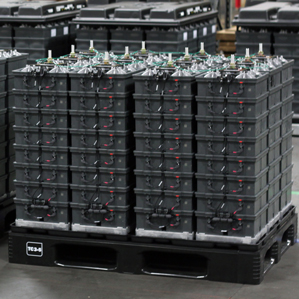A Battery to Prop Up Renewable Power Hits the Market
A new kind of battery that stores energy from solar and wind power cheaply and cleanly has hit the market. It is by far the cheapest of a new generation of large, long-lived batteries that could make it possible to rely heavily on intermittent, renewable energy sources.

Aquion Energy, a company spun out of Carnegie Mellon University, recently delivered the first of its batteries to operators of small power grids, or “microgrids,” that can operate independently of the centralized grid.
Microgrids, which typically use local energy sources such as wind, solar, and hydropower, could help hundreds of millions of people who live beyond conventional grids get reliable electricity. Batteries can store power from solar panels or wind turbines to provide round-the-clock power. Alternatively, diesel generators can be used.
Aquion’s batteries use sodium ions from saltwater as their electrolyte. Electrical current moves through this brackish liquid from positive electrodes based on manganese oxide to negative ones based on carbon. The batteries are large and operate slowly, but they are also manufactured cheaply, using repurposed manufacturing equipment. Last week Aquion announced $34.6 million in funding to help it scale up production.
The batteries cost about as much as lead-acid ones, which are sometimes used now, but they last twice as long, effectively cutting the long-term costs in half (see “Demo: Storing the Sun”). Other long-lived batteries exist, but they cost far more than lead-acid batteries.
The new energy storage technology could be crucial to making renewable energy more viable, especially in remote locations. By making solar power cheaper than diesel fuel in many places, it could help bring clean power to some of the more than one billion people in the world without reliable electricity (see “A Billion People in the Dark”).
As costs come down further, the batteries could find new applications beyond microgrids, including stabilizing conventional power grids as they come to rely more heavily on renewable energy.
The company isn’t disclosing where its batteries are being used—except to say the projects are international.
Deep Dive
Climate change and energy
The problem with plug-in hybrids? Their drivers.
Plug-in hybrids are often sold as a transition to EVs, but new data from Europe shows we’re still underestimating the emissions they produce.
Harvard has halted its long-planned atmospheric geoengineering experiment
The decision follows years of controversy and the departure of one of the program’s key researchers.
Why hydrogen is losing the race to power cleaner cars
Batteries are dominating zero-emissions vehicles, and the fuel has better uses elsewhere.
Decarbonizing production of energy is a quick win
Clean technologies, including carbon management platforms, enable the global energy industry to play a crucial role in the transition to net zero.
Stay connected
Get the latest updates from
MIT Technology Review
Discover special offers, top stories, upcoming events, and more.